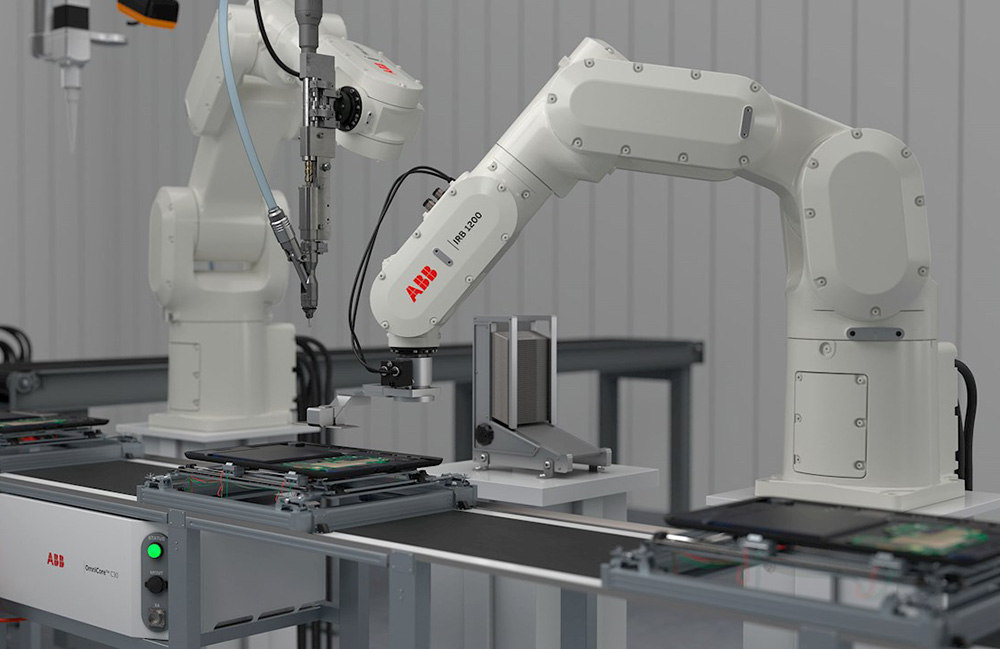 ABB said its upgraded IRB 1200 family is faster and more precise than its predecessors. | Source: ABB Robotics
ABB said its upgraded IRB 1200 family is faster and more precise than its predecessors. | Source: ABB Robotics
ABB Robotics today introduced three new robot families in China and evolved its IRB 1200 line of of collaborative robots globally. According to the company, both updates will help it better target companies in Asia and beyond.
“With rising demand from SMEs [small and midsize enterprises] in Asia and beyond, the need for adaptable and efficient small automation solutions has never been greater,” stated Marc Segura, president of ABB Robotics. “The new IRB 1200 takes efficiency and productivity even further in the most precise automation tasks.”
The new generation IRB 1200 family comes in four variants — 5, 7, 8, and 9 kg (11, 15.4, 17.6, and 19.8 lb.). ABB said this makes it suitable for handling larger or heavier parts. The robots use the OmniCore controller and offer motion control with path accuracy to just 0.6 mm (0.02 in.) and pose repeatability down to 0.011 mm (0.0004 in.), even for multiple robots at high speeds of up to 1,600 mm/s (3.5 mph).
A 5% faster cycle time ensures that the new cobots deliver precision for high-throughput, complex applications such as surface finishing, assembly, and dispensing. ABB said it designed the robot arms for electronics, manufacturing, automotive electronics, and consumer industries.
ABB Robotics & Discrete Automation is a leading provider of industrial robots, autonomous mobile robots (AMRs), and machine automation. In April, ABB Group announced plans to spin off the division, which employs about 11,000 people at more than 100 locations in 53 countries, including its North American headquarters in Auburn Hills, Mich.
New robots designed for high-growth sectors
Each of ABB’s three new robot families is being manufactured at its state-of-the-art Shanghai Mega Factory. The company said the new robot families can satisfy a wide range of automation needs in high-growth sectors, including electronics, consumer goods, and general industries.
The robots can address material handling as well as high-end applications such as dispensing and polishing. The new families include:
Lite+: ABB said it built this line for essential material handling and pick-and-place operations. Lite+ is compact, easy to use, and lowers the barriers to automation for smaller operators, the company claimed. Available in China and Asia, its integration with the new IRB 1200 and other IRB robots offers flexibility for industries including electronics manufacturing.
PoWa: PoWa is a compact cobot built for speed, collaboration, and efficiency. With industrial-level speeds of up to 5.8 m/s (12.9 mph), it can be used for fast picking, palletizing, and machine-tending tasks. Available in China, PoWa’s no-code programming and plug-and-play capabilities mean it can be operational within 60 minutes of unboxing, making it particularly attractive to SMEs.
IRB 1200 (New Generation): The redesigned IRB 1200, available globally, is optimized for high-speed, high-precision applications including assembly, polishing, and dispensing. Approximately 20% lighter and more compact than its predecessor, the IRB 1200 enables manufacturers to create space-efficient production cells, boosting throughput and operational efficiency, said ABB.
All are powered by ABB Robotics’ OmniCore control platform for full integration of AI, sensor, cloud, and edge computing systems to create the most advanced and autonomous robotic applications.
ABB invests in its Chinese operations
This strategic expansion comes as China’s mid-market robotics segment has experienced a 24% compound annual growth rate (CAGR) between 2021 and 2024. The International Federation of Robotics (IFR) predicted that the market will continue growing at 8% annually through 2028.
“China is the world’s largest robotics market and for ABB Robotics,” said Sami Atiya, president of ABB Robotics & Discrete Automation Business Area. “China’s growth in sectors such as electronics and from small and medium-sized businesses is driving the increasing demand for accessible, user-friendly solutions, and we are responding to that demand.”
“With our new robot families, we are not only expanding what is already the most comprehensive and integrated offering in the market, but we are [also] helping new industries and customers automate with new mid-market value propositions,” he added.
ABB’s launch event in Shanghai featured an AI-driven natural language software tool for teaching robots, using its new PoWa cobot. Combining generative and analytical AI, the technology speeds up the teaching process for robots using three simple steps: “see, speak, do.” This involves the robot visually perceiving its environment, processing verbal instructions in real time, and immediately translating them into precise actions.
China is the world’s largest robotics market and accounted for more than half of global robot installations in 2023. With over 90% of ABB robots for Chinese customers now manufactured locally, the company said the launch demonstrates its commitment to China’s advanced manufacturing transformation.
